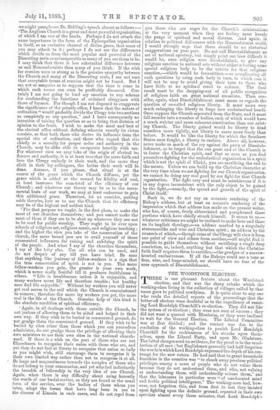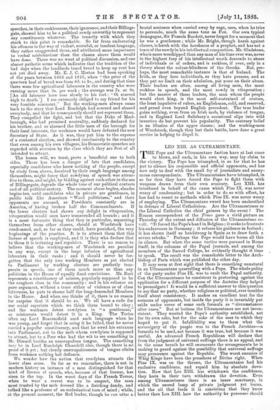THE WOODSTOCK ELECTION. T HERE is one pleasant feature about the
Woodstock election, and that was the sharp rebuke which the working-class living in the collection of villages called by that name gave to political rowdyism. It is quite clear to any one who reads the detailed reports of the proceedings that the better-off electors were doubtful as to the expediency of resist- ing Lord Randolph Churchill's re-election. They did not like the system of re-election ; they were not sure of success ; they did not want a quarrel with Blenheim, or they were inclined to wait for the General Election. The Liberal Committee was at first divided ; and the contest was due to the resolution of the working-class to punish Lord Randolph Churchill for the recklessness of his attacks upon them- selves, upon the Liberal Party, and upon Mr. Gladstone. The latter charges need no evidence, for the proof is in the recol- lection of all men ; but Englishmen generally had half forgotten the words in which Lord Randolph expressed the depth of his con- tempt for the new voters. He had said that to grant household franchise in the counties was "to chuck away precious political privileges among a mass of people who do not value them because they do not understand them, and who, not valuing or understanding them, will undoubtedly misuse them," and that the labourers in particular were "of uneducated mind and feeble political intelligence." The working-men had, how- ever, not forgotten this, and from first to last they insisted upon fighting upon the definite ground, repeated in their own speeches almost every three minutes, that Lord Randolph's
speeches, in their recklessness, their ignorance, and their Billings- gate, showed him to be a political rowdy unworthy to represent any constituency whatever. The tenacity with which they stuck to this point is remarkable. So far from underrating his offences in the way of violent, scornful, or insolent language, they rather exaggerated them, and attributed more importance to verbal misbehaviour than the classes above them would have done. There was no want of political discussion, and one almost pathetic scene which indicates that the tradition of the bad days when the landlords taxed bread to keep up rent has not yet died away. Mr. E. J. C. Morton had been speaking of the years between 1816 and 1846, when "the price of the quartern loaf of bread was from 8d. to Is., and during that time there were few agricultural labourers in the country who were earning more than 9s. per week ; the average was 7s. or 8s. rAn old labourer here rose slowly to his feet : Oi starved nigh to death.] I am extremely obliged to my friend for his very forcible comment." But the working-men always came back to the story that Lord Randolph had scorned and abused everybody, and that he consequently should not represent them. They compelled the fight, and but that the Duke of Marl- borough, who had promised neutrality, suddenly declared for his brother, and so alarmed the little men of the borough for their local interests, the workmen would have defeated the new Secretary of State. As it was, they put him to the expense of a contested election, and showed conclusively to the country that even among his own villagers, his Democratic speeches are regarded with aversion by the class which they are first of all intended to attract.
The lesson will, we trust, prove a beneficial one to both sides. There has been a danger of late that candidates, especially candidates who know nothing of the people, except by study from above, deceived by their rough language among themselves, might fancy that rowdyism of speech was attrac- tive to them, and might, by bidding against each other in the use of Billingsgate, degrade the whole tone of our political contests and of all political oratory. The moment abuse begins, slander begins too, until candidates who in private are gentlemen, in public talk like American "Ward politicians," and their opponents are accused, as Presidents constantly are in America, of having broken half the Commandments. If the lower electors had shown any delight in vituperation, vituperation would soon have transcended all bounds ; and it is a most fortunate thing that they in particular, separating themselves from- other classes, should at Woodstock have condemned, and, so far as they could, have punished, the very beginnings of the practice. It is to attract them that this license of speech is employed, and it is they who declare that to them it is irritating and repulsive. There is no reason to believe that the working-men of Woodstock are peculiar in any way, except in the large infusion of agricultural labourers in their ranks ; and it should never be for- gotten that the only two working Members as yet elected to Parliament by working electors are perfectly tem- perate in speech, one of them much more so than any politician in the House of equally fixed convictions. Mr. Burt represents a constituency of miners, popularly supposed to be the roughest class in the community ; and in his reliance on pure argument, without a trace either of violence or of class bitterness, he puts to shame half the long-descended Members in the House. And when one thinks of it, there is no reason for surprise that it should be so.' We all have a code for our social superiors which we think them bound to obey ; and the workmen detest rowdyism in "a gentleman," as aristocrats would detest it in a King. The Tories often say Lord Beaconsfield used such language when he was young, and forget that in using it he failed, that be never carried a popular constituency, and that he owed his entrance into Parliament, not to the mob whom rowdyism is supposed to attract, but to a Peer who had the wit to see something in Mr. Disraeli besides an unscrupulous tongue. The something may be in Lord Randolph Churchill also, though there is no proof of it yet ; but clearly unscrupulousness of tongue elicits from workmen nothing but defiance.
We wonder how the notion that rowdyism attracts the lower class arose. So far as we remember, there is not in modern history an instance of a man distinguished for that kind of license of speech, who, because of that license, has risen to the top. In the worst days of the French Terror, when to wear a cravat was to be suspect, the man most trusted by the mob dressed like a finicking dandy, and talked like a professor of an ecclesiastical turn of mind ; while, at the present moment, the Red leader, though he can utter a brutal sentence when carried away by rage, uses, when he tries to persuade, much the same tone as Fox. Our own typical demagogue, Sir Francis Burdett, never forgot for a moment that he was a gentleman ; while Mr. Bright, though harsh against classes, is harsh with the harshness of a prophet, and has not a trace of the rowdy in his intellectual composition. Mr. Gladstone, who is more worshipped than any man of his time ever was, never in the highest fury of his intellectual wrath descends to abuse of individuals or of orders, and is reckless, if ever, only in a theory about the colour-blindness of the Greeks. But, per- haps, the most remarkable instance is that of Ireland. The Irish, as they love individuals, so they hate persons, and as they put no limit on their adulation, put none on their abuse. Their leaders are often, among all living men, the most reckless in speech, and the most rowdy in vituperation ; but the master of those leaders, the man whom the people would elect king, is the most self-restrained of orators, the least impulsive of rulers, an Englishman, cold, and reserved, and proud even beyond English precedent. The true leader gains nothing, even from an Irish mob, by violence of tongue, and in England Lord Salisbury's occasional slips into wild invective do but prevent his popularity. The contrary belief is an illusion of the upper classes ; and the working-men of Woodstock, though they lost their battle, have done a great service in helping to dispel it.



































 Previous page
Previous page